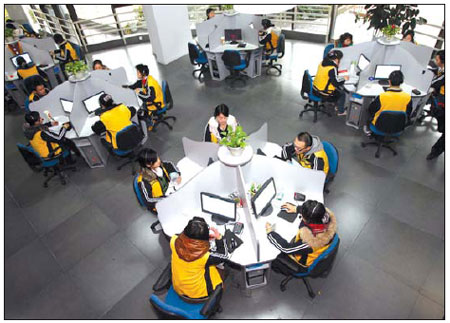Call of the future
Updated: 2011-05-20 10:45
By Zhang Jing (China Daily European Weekly)
Customer responses help companies improve marketing, quality control
Tao Hanxiao, 22, has just started her career. Since her current job does not allow her too much of free time for lunch, she and her colleagues often dial the hotline number 400 for fast food. But unlike most of her peers, Tao also knows what it is like on the other end of the phone.
Tao, a college student, works during the weekends at the Yum! call center. The Fortune 500 Yum! Brands Inc based in Kentucky, USA, owns fast food giants like KFC, Pizza Hut and Taco Bell. By last count there are estimated to be over 1,400 KFC outlets and 300 Pizza Hut restaurants in China.
Tao was assigned to the Pizza Hut group at the call center. After one month's training, she was able to take phone calls.
|
 Employees work inside a call center in the Chongqing service outsourcing industrial park. [Provided to China Daily] |
"Each team has seven to eight people, and the team leader is called 'head of the family', who checks randomly on the quality of our recorded phone calls," says Tao.
"There are three shifts that run between 10 am and 9 pm. Peak hours are from 11 am to 1 pm and from 5 pm to 7 pm."
The call center, located in northwest Beijing, is spread over an area of two classrooms with some 60 seats occupied mostly by female employees. Most of them are part time employees. There are very few male workers in the call center.
"The pay is around 10 yuan (1.09 euros) per hour, a little higher than that in McDonald's," says Tao. "But it's not an easy job, especially when you have to put on a sweet tone all the time. And by the end of the day, you often have a sore throat.
"Call centers are also perhaps the best place to nurture adversity quotient (AQ). Many customers are impatient and when they lose their temper, they scold you for no reason at all," she says.
In November 2010, the Ministry of Industry and Information Technology streamlined the procedures for examination and approval of offshore call centers, where foreign-invested or joint ventures can enjoy unlimited share.
Li Baomin, a graduate from Ohio State University, is the pioneer of China's call center outsourcing business, after setting up 95Teleweb in 1998.
"Call centers in China have transformed, integrating customer service, information resources, quality control and marketing, and are centers that bring profit and added value to companies," says Li.
Data published early this year indicates there were more than 500,000 seats in call centers across China by the end of last year. That, in turn, creates a huge market of more than 48 billion yuan.
E-paper

Green works
Wuxi becomes 'test case' for facing country's environmental challenges
Preview of the coming issue
The global rise of Chinese brands
China-EU trade on solid ground
Specials

The song dynasty
There are MORE THAN 300 types of Chinese operas but two POPULAR varieties are major standouts

Cut above the rest
One of the world's oldest surgeons has performed more than 14,000 operations

From the ground up
Architect of Guangzhou Opera House has many projects under way, including 2012 Olympics.
